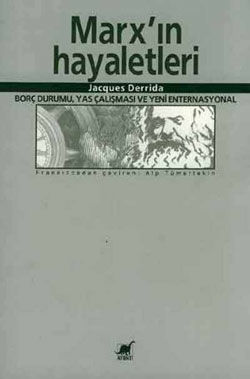
Marx'ın Hayaletleri
Derrida çağımızın en özgün düşünürlerinden biri kuşkusuz. 1950'lerde özellikle Fransız kültüründe etkili olan yapısalcılık ve sonrasındaki Marksist, eleştirel, özeleştirel tartışmalarda doğrudan taraf olmadı Derrida. Platon, Rousseau, Kant, Hegel, Nietzsche, Husserl, Heidegger, Freud okumaları sonrasında kendi adıyla birlikte anılan "yapıçözüm"le çıktı düşünce sahnesine. Bu karmaşık kavramsal düzenek, Batı düşünce tarihinin ve buna bağlı kültürel, siyasi, teknik pratiklerin, tavır alışların mekanizmasını çözümlemeye elverişli bir araçtı. Yapıçözüm geçmişin hayaletleriyle olduğu kadar söz konusu kültürel ortamla da diyalog içinde oluşturulmuştu.
Derrida, 1989'da duvar yıkıldıktan sonra ve Marksizmin duvarın yıkıntıları altında kaldığını sokaktaki adamın bile dile getirdiği bir sırada, Marx'ın Hayaletleri'yle Marksizm hakkında söz aldı. Liberalizmin ve şu anda var olduğu haliyle demokratik yönetimlerin zafer çığlığına ve eski bir Hegelci tema olan "tarihin sonu"nu ilan eden Fukuyama'ya çözümleyici bir değerlendirmeyle yanıt verdi. Marx'ın mirasının dinsel mesihçilikten ayrı bir mesihsel izlek çerçevesinde yeniden okunarak sahiplenilmesi gerektiğini savundu. Aykırı bir zamanda aldığı bu tavırla belirli bir "Marksizm ruhu"na sadık kaldığını ilan etti. Marx'ı çok sevdiği Shakespeare ve Max Stirner üzerinden yeni bir gözle okumaya girişti. Hatta bir "Yeni Enternasyonal" önerdi: Zamansız ve konumsuz, adsız ve unvansız, gizli değilse de pek az kamusal, sözleşmesiz, eşgüdümsüz, partisiz, vatansız.... bir "karşı-fesat" birliği.
Marx'ın Hayaletleri'nde "zaman ayrılık", "zamanın çığırından çıkmışlığı", "mevcudiyetin kendi kendisiyle bir türlü örtüşememesi", "yabancılaşma", "meta", "fetiş", "giderek karmaşıklaşan tele-teknolojiler ve protez sorunu" gibi konuları tartışıyor Derrida. Bu canlı sorunların Marksizmin şiirselliğinden bir türlü kurtulamamasının nedeni olan hayalet ve musallat olma mantığının kökenlerine iniyor.
Derrida'ya göre Marx "sahne mantığı" denebilecek bir mantığın taslağını çizer. Ama bunu aşmak üzere bu mantığın dışında "sahici", zamanın yerine yeniden yerleştiği, adaletin sağlandığı bir dünya varsayımına duyduğu inancın getirdiği ironi ve keyifle çizilir bu taslak. Bu onu mesihsel bir damara bağlar. Marksist eleştiri "sahici" ile "sahte" arasında böylesi ülküsel karşıtlıklar oluşturma iznini kendine verir. Oysa yapıçözüm, eleştirinin kendisini olanaklı kılan ülküselliğin ve "hayaletimsi" olanın indirgenemezliğini vurgularken Marx'ın çoğul ruhlarına yaslanır.
Eğer Marksizmin birden fazla ruhu varsa, bu varlıkbilimsel varyok (to be or not to be) kategorilerini aşar. Bu durumda teşhis edilen "ölüm"ün kesinlikten yoksun olmasıdır asıl korku nedeni. Verili bir hukuka indirgenemez olan adalet ve gelecek için bir hayaletin gizine sahip çıkmak gerekliliği doğar o zaman.
Sayfa Sayısı: 268
Baskı Yılı: 2001
Dili: Türkçe
Yayınevi: Ayrıntı Yayınları
İlk Baskı Yılı : 2001
Dil : Türkçe
| Yayınevi | : | Ayrıntı Yayınları |
| Sayfa Sayısı | : | 268 |
| ISBN | : | 9789755392820 |
| Dil | : | Türkçe |


